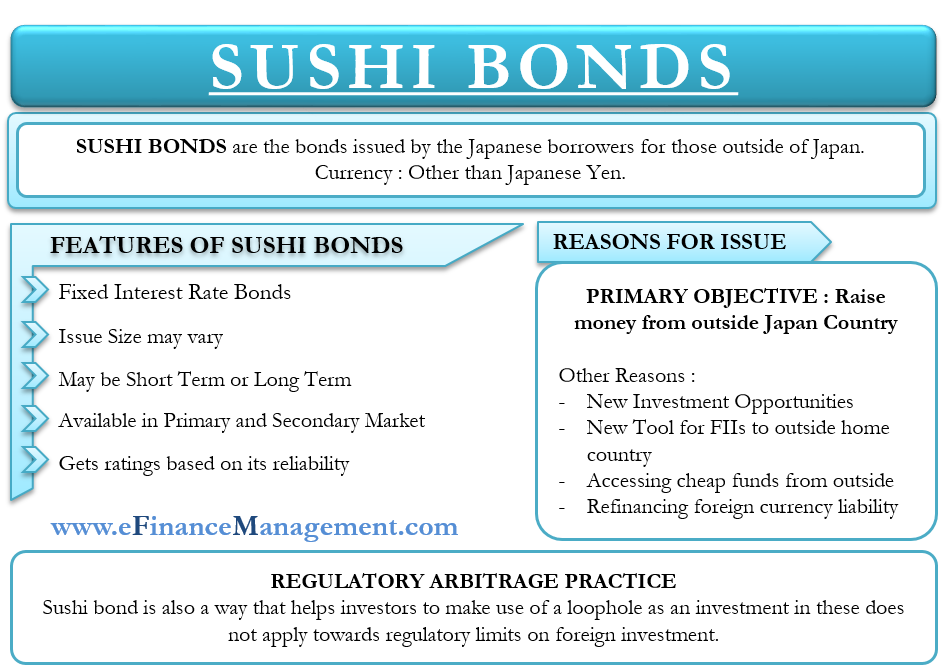Sushi bonds are the bonds issued by Japanese borrowers for those outside Japan. These bonds are denominated in a currency other than the Japanese yen, usually in the US dollar or the currency of the market where these bonds are issued.
Features of Sushi bonds
Following are the features of these bonds:
- These bonds carry a fixed rate of interest.
- The size of the issue may vary.
- The bonds could be short or long-term.
- Investors may buy it directly or from the secondary market.
- Similar to other bonds, these bonds also get ratings on the basis of their reliability.

Why Sushi Bonds Are Issued?
The primary objective of issuing these bonds is to allow Japanese borrowers to raise money from investors outside of the jurisdictions of Japan. Moreover, lending to Japanese companies in their own currency is a more attractive and convenient option for investors.
Reasons to issue bonds overseas could be many, such as:
- Tapping new investment opportunities.
- Offering a new tool for institutional investors to invest outside their home country.
- Accessing cheap funds outside the country.
- Refinancing foreign currency liabilities.
- Allow Japanese investors to add currency diversification to their bond portfolio.
Usually, Japanese institutional investors buy these bonds, though other investors can buy them as well. Since these bonds are outside the Japanese jurisdiction, they do not apply to the regulatory limits on foreign investment. Generally, Japanese insurance companies buy these bonds.
Regulatory Arbitrage Practice
Sushi bond is one of the ways of regulatory arbitrage practice. The objective of such a practice is to overcome unfavorable regulations. Or, we can say it is the practice to make use of the loopholes for the benefit of the investors. Thus, sushi bond is also a way that helps investors to make use of a loophole as an investment in these does not apply to regulatory limits on foreign investment.
Also Read: International Bond Market
Usually, regulatory arbitrage practices for investors occur in the form of foreign market transactions. This is because such transactions fall outside the jurisdiction of one country.
Other Similar Bonds
Shogun or geisha bond share the same concept as sushi bond. A foreign company operating in Japan can issue a shogun bond in Japan in a foreign currency. For example, a US company issues bonds in the US dollar in Japan.
There is also a samurai bond. A bond that a foreign company issue in Japan in yen is a samurai bond. Then there are dragon bonds, which are the bonds issued in Asia and priced in US dollars.
Final Words
Sushi bonds were very popular in 1985, but they lost their relevance after the Japanese yen became powerful. IBM is a good example of a company issuing such bonds for its advantage.
Continue Reading – Bonds and their Types.
RELATED POSTS
- Bond Market: Meaning, Types, Strategies, Bond Indices and More
- Plain Vanilla Bonds
- Brady Bonds – Meaning, History, How it Works? and More
- Bonds and their Types
- Green Bonds – Meaning, Principle, History, Types, Advantages, and Disadvantages
- Debt Market: Meaning, Issuers, Instruments, Advantages, Disadvantages, and More

